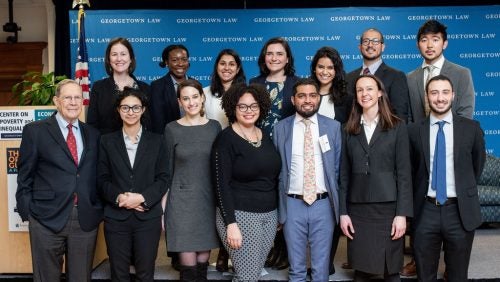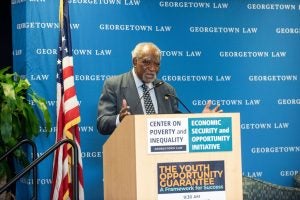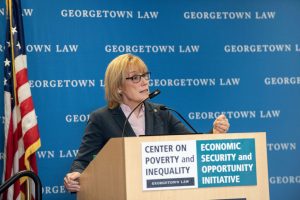“Youth Opportunity Guarantee” Critical for U.S., Center on Poverty and Inequality Says
February 5, 2020

The Center on Poverty and Inequality’s Economic Security and Opportunity Initiative staff with organizers of the Youth Opportunity Guarantee at a Dec. 5 event.
Nearly a decade into the U.S. economic recovery, more than 4 million young people ages 16-24 are neither working nor in school.
“Throughout its history, the United States has taken steps toward ensuring a fair chance for every child, regardless of their background.” says Laura Tatum of Georgetown Law’s Center on Poverty and Inequality, “But today, youth face considerable barriers to achieving their educational goals and securing a good job,”
These barriers to success hurt youth, and deprive employers and the economy as a whole of a critical foundation for a thriving labor market, says Tatum, the Center’s director of jobs and education.
The Center on Poverty and Inequality is a leader in developing solutions to the education and employment challenges youth face, which it has identified as largely stemming from underfunded and disconnected secondary, postsecondary, and workforce systems.
The status quo is not working for young people, the Center’s faculty director, Professor Peter Edelman told assembled advocates, policymakers and students at a recent event on campus. “We’ve made progress, but it’s not sufficient.”
Youth Opportunity Guarantee
To accelerate progress towards improved youth education and workforce outcomes, the Center on Poverty and Inequality’s Economic Security and Opportunity Initiative engaged more than 100 experts and stakeholders across the country to create the Youth Opportunity Guarantee. The plan aims to guarantee every young person, ages 16 to 24, the opportunity for long-term career success.
The Guarantee promises three things: a high school or equivalent education that prepares youth for college and a career; a range of postsecondary options that help lead to career success; and quality career training, national service, or employment.
On Dec. 5, the Center in partnership with the National Youth Employment Coalition and America’s Promise Alliance, invited allied organizations, youth leaders and lawmakers to Georgetown Law unpack key principles and advance ideas to operationalize the Guarantee.
“What the Youth Opportunity Guarantee proposes is a more cohesive, more seamless vision for how young people should experience education and the workforce,” said Thomas Showalter, executive director of the National Youth Employment Coalition.
Equity is Key
That vision must include a focus on race and gender equity as well as youth-adult partnerships as core principles, Showalter said. To that end, the Guarantee includes strategies to ensure all young people receive resources and support in proportion to the barriers they face, especially low-income youth, youth of color, LGBTQ youth, immigrant youth, girls and young women, and youth with disabilities.

U.S. Representative Danny K. Davis
“It can be somewhat jarring for a young person to walk into a work environment and not see someone that looks like them,” tweeted panelist Grace Suh, IBM’s vice president of education.
The event included two panels: “Why do we need a Youth Opportunity Guarantee?” and “How would the Youth Opportunity Guarantee work – how do we enact and operationalize it? Why do you think a Youth Opportunity Guarantee is possible?”
For panelist Shawnice Jackson of the Youth Advocate at Opportunity Youth United, the need for youth-adult partnership is key. Those most impacted by an issue are the greatest asset in solving the problem, she said.
U.S. Rep. Danny K. Davis (D-Ill.) also addressed the audience, asking how we as a nation can foster the kind of changes the Center on Poverty and Inequality has proposed. “How do we create the Guarantee?” he asked. “We do it through engagement and involvement.”
Davis, chair of the House Subcommittee on Worker & Family Support, recommends using the Social Services Block Grant to serve at-risk youth, strengthening child welfare laws, promoting quality job training programs, revamping the fatherhood support program, and passing the ELEVATE Act to create new jobs.
Bringing Those on the Margins In

U.S. Senator Maggie Hassan
Sen. Maggie Hassan (D-N.H.), a member of the Senate Committee on Health, Education, Labor, and Pensions, said guaranteeing opportunity for youth isn’t a new or revolutionary idea. “We should think of it as a part of the ongoing call to the vision that is the United States of America,” she said. “Our work is to guarantee opportunity.”
Hassan outlined policies she’s proposed, including the bipartisan Gateway to Careers Act, which provides grants to support partnerships between industry, associations, and community colleges that remove many of the barriers preventing people from completing two-year degrees; and the Fast Track To and Through College Act, which would allow high school students to take college programs. She said giving young people opportunities is important for the economy, but it’s also a critical part of who we are as a democracy.
“We talk about the importance of an educated citizenry to our civic life,” Hassan said. “The American mission is to bring out the best in each other. Our founding documents say we are supposed to bring in people from the margins into the heart and soul of our democracy, and that the process of doing that strengthens us.”